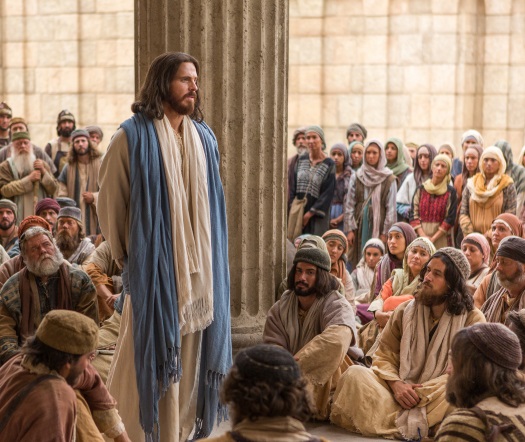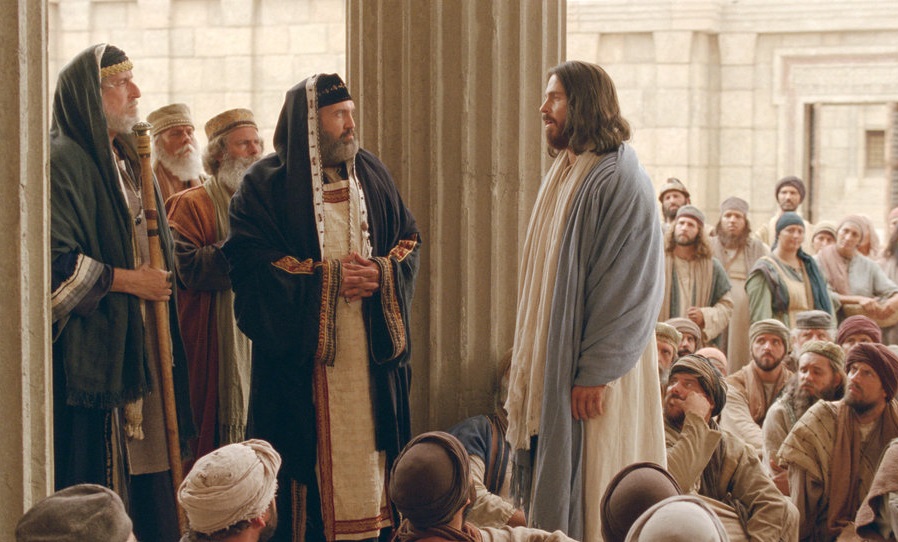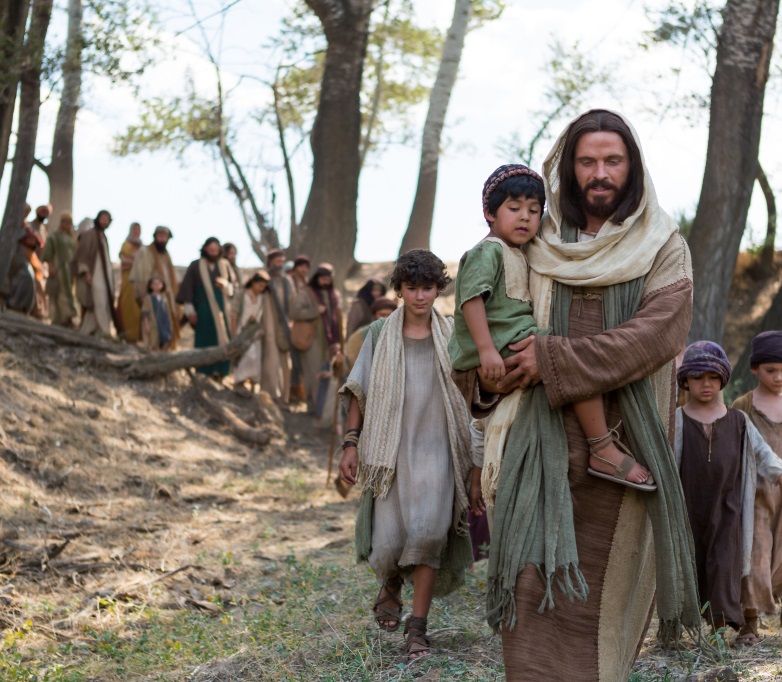Jesus & the Law – on the priesthood … (11/30/18)
It goes almost without saying that any society placing immense reverence upon its central Temple would be expected to bestow equal honor upon the priests inhabiting the same, and such was indeed the case in ancient Israel. On the one hand, the Law demanded that its priests1 adhere to strict behavioral guidelines.2 On the other hand, the Law demanded that those priests be treated with the deepest respect – an almost profound honor – by the Jewish layman (see Leviticus 21:8-10a). Of course, here as well Jesus was true to form in his open rejection of this man-elevated status. Consider …
*Whereas it was clear that the Law gave the priesthood the ability (indeed, the daily duty) to bless the Jewish people (see Numbers 6:23-28), Jesus took it upon himself to repeatedly perform this traditionally priestly duty – openly & unabashedly blessing “the poor in spirit” (Matthew 5:3), “those who mourn” (Matthew 5:4), “the meek” (Matthew 5:5), “those who hunger and thirst for righteousness” (Matthew 5:6), “the merciful” (Matthew 5:7), “the pure in heart” (Matthew 5:8), “the peacemakers” (Matthew 5:9), those “persecuted for righteousness’ sake” (Matthew 5:10), those persecuted &/or slandered for championing The Way of Christ (Matthew 5:11 & Luke 6:22), those “who take no offense” at his message (Matthew 11:6 & Luke 7:23), those who truly understood his teachings (Matthew 13:16 & Luke 10:23), those who were “destitute” (Luke 6:20), those who were hungry (Matthew 6:21a), those who were saddened (Matthew 6:21b), “those who hear the Word of God and obey the same” (Luke 11:28), those who enlivened his teachings on selfless service (John 13:15-17), and those who believed in the practicality of his message without proof of the same (John 20:29 – see also Luke 24:50).
.*Whereas the Law strongly implied that it was the special knowledge held by the priesthood that provided the foundation of Jewish culture and the sanctity of Jewish salvation, Jesus had the seeming gall (and the outright courage) to say “Everyone then who hears these words of mine and acts on them will become like a wise man who built his house on stone.”3 (see Matthew 7:24-27 & Luke 6:47-49) Indeed, the Gospels often mention that Jesus, while not a priest himself, taught “as one having [priestly] authority” (see Matthew 7:28-29 – also Matthew 13:54, Matthew 22:33, Mark 1:22, Mark 12:17, Luke 4:32, Luke 20:26, & John 7:15), and he is even seen giving other non-priests (his disciples) priestly powers & authorities (see Matthew 10:1-16, Mark 6:7-13, Luke 9:1-6, & Luke 10:1-12).

*Whereas the Law endowed priests (and their Pharisee scribes) with great power and demanded they be deeply respected (if not outright revered) by the Jewish layman (see Exodus 19:6, Leviticus 10:3, Leviticus 19:32 – also Matthew 23:6, Mark 12:38, Luke 11:43 & Luke 20:46 et al), Jesus had the audacity to criticize them publicly – calling out & sternly rebuking their material opulence (see Matthew 11:8), their general ignorance (see Matthew 11:25), their faulty interpretations of the Law (even equating the same with yeast, a highly impolite analogy in Jewish culture – see Matthew 16:5-12), their arrogance (see Matthew 23:11-12, John 9:40-41, & Luke 14:11‘s “For all who exalt themselves will be humbled”), their love of receiving undue honor in public (see Matthew 23:5-10, Mark 12:38-40, Luke 11:43, & Luke 20:45-47‘s “They will receive the greater condemnation”, along with Luke 14:7-10), their adoration of material wealth (see Luke 16:14-15), their cold-hearted callousness (see Matthew 23:13-144 & Luke 11:52), their dogmatic zealotry (see Matthew 23:15), their moral hypocrisy (see Matthew 23:25-28 & even likening them to “unmarked graves” – a scathing insult for any Jew, much less a supposedly esteemed religious leader – in Luke 11:37-44), and their hollow piousness (see Luke 18:9-14, where even the hated tax collector was presented as more holy than the Pharisees). Indeed, Jesus had the gall to state that “many who are [considered] first will be last, and [many thought to be] last will be first”5 (see Matthew 19:30 – also Matthew 20:16, Mark 10:31, & Luke 13:30), implying that even the gravest of repentant sinners would enter the Kingdom of God before even the most superficially devout of priests – a sentient echoed by Jesus on the many occasions where he raised up “very young children” as the bellwether of spiritual purity, not the priestly elite (see Matthew 18:1-14, Matthew 19:13-15, Mark 9:33-37, & Luke 9:46-48). And as if that wasn’t bold enough, Jesus even went out of his way to imply that it was the priestly scribes & Pharisees who were not only inaccurate in their living of the Law, but active saboteurs thereof who were purposefully keeping others from understanding &/or enlivening the same (see Matthew 18:6-7, Mark 9:42, Luke 17:1-2, & Luke 11:52‘s “Woe to you scribes [and Pharisees]! For you have taken away the key of knowledge. You do not enter [the Sanctuary] yourselves, and yet you hinder those who are attempting to enter” – in juxtaposition with Leviticus 19:14‘s call to “put no stumbling block before the blind”).
.*Whereas the Law established the priests as the sole presenters of spiritual truth, Jesus blatantly proclaimed himself to be just such an authority as well – calling on others to “follow me” instead of the traditional priestly leadership (see Matthew 4:19, Matthew 8:22, Matthew 9:9, Matthew 10:38, Matthew 16:24, Matthew 19:28, Mark 1:17, Mark 8:34, Mark 10:21, Luke 5:27, Luke 9:23, Luke 18:22, John 1:43, John 8:12, & John 12:26 et al). He called for others to “acknowledge me” (i.e. honor his teachings; see Matthew 10:32-33 – also Mark 8:37-38 & Luke 12:8-9) and “welcome me” (i.e. accept him as a viable prophet; see Matthew 10:40-42 – also Mark 9:41, Luke 10:16, John 5:23, & John 13:20), he claimed to be a true emissary of God the Father (see John 8:19-23, John 12:44-45‘s “whomever sees me sees [a reflection of] Him who sent me”, John 13:20, & John 15:18-24 et al), and he even openly called for others to become disciples of his Way, his Truth, and his Life (i.e. those who would emulate his life by enlivening his teachings on the Law; see John 14:6‘s “No one comes to the Father except through me” – also Matthew 10:24-25, Matthew 10:37-38, Matthew 11:29, Matthew 16:24, Luke 6:40, Luke 14:26-33, John 8:31-32, John 13:34-35, & John 15:4-8 et al).
*Whereas the Law required that priests be anointed with sacred oil (oil that was not allowed to be used “in any ordinary anointing of the body” and oil that was not allowed to be made or concocted by any unsanctioned individual – see Exodus 30:25-33), Jesus went out of his way to have himself so anointed (see Matthew 26:6-13, Mark 14:3-9, Luke 7:36-50, & John 12:1-11).
.*Finally, whereas the Law tended to “dumb down” the populace – having the common folk believe that they were neither intelligent nor sophisticated enough to attain spiritual well-being without the assistance of the priests, Jesus preached the opposite doctrine – namely, that priestly mediators were completely unnecessary for the attainment of spiritual redemption; that each & every individual (Jew and non-Jew alike) could attain entry into what he called “the Kingdom of Heaven” by simply enlivening the underlying intent of the commandments in their everyday dealings with others (see Matthew 7:7, Matthew 7:21, Matthew 13:18-23, Matthew 18:19-20, Matthew 24:12-14, Mark 4:11-12, Mark 10:13–16, Luke 11:9, Luke 8:11-15, Luke 18:15-17, John 13:15-17, John 14:13, John 15:7, & John 16:23 – along with Note 118 on page 56 herein).
“Whoever is not with me is against me, and whoever does not gather with me will scatter … For now is the judgment of this world, and now is the time when the rulers of this world will be driven out.” ~ Jesus Christ (Matthew 12:30 & John 12:31)

“Then some of the Pharisees said to him, ‘Teacher, tell your disciples to stop praising you and your message.’ And Jesus answered, ‘Truly, I tell you: if my supporters were to become silent, the stones would begin to shout.’ … Then the Pharisees turned to one another and said, ‘You see, we can do nothing, for the entire world has already gone after him.’” ~ via Luke 19:39 & John 12:19
………………………………………………….
1 The Old Testament regulations mention the Kohanim and the Levites when speaking of the priesthood, with the former being the priests who performed the Temple’s holy duties and the latter essentially being helpers thereof – assigned to play music, provide Temple security, wash the Kohanim‘s hands & feet before services, or bestow Temple maintenance.
2 … such as maintaining proper personal dress & hygiene (Leviticus 10:6), washing their hands & feet before every service (Exodus 30:19), wearing the requisite vestments during each service (Exodus 28:2-4), remaining within the bounds of the Sanctuary’s Courtyard during every service (Leviticus 10:7), never touching the dead (Leviticus 21:1) unless mourning a deceased relative (Leviticus 21:3), never marrying divorcees or otherwise profaned women (Leviticus 21:7), and remaining ritually clean whenever serving in the Sanctuary (Leviticus 22:2-3) …
3 This was a reference made even more bold by its obvious allusion to the stone-built holy sanctuaries mentioned in Exodus 20:24-26, Deuteronomy 12:2-27, 1 Kings 5.17-18, 1 Kings 6:7, and Amos 5:11 et al …
4NOTE that Jesus accusing the scribes & Pharisees of “devouring widows’ houses” in this passage takes on special significance in light of the fact that GOD was a famed “defender of widows” (Psalm 68:5) – openly providing for them in Deuteronomy 16:11-14, Isaiah 10:1-3, Jeremiah 22:1-5, & Ezekiel 22:6-7. Indeed, even Jesus himself is seen caring for widows in Luke 7 & John 19, making this particular rebuke even more potent.
5 While not directly relevant to the point at hand, it is intriguing to look at this statement in light of the final chapters of the Gospel of Luke, where we see Peter – for first of Jesus’ followers – “getting it” last (denying Jesus three times on the night of his pre-arranged arrest; see Luke 22:54-62) and the “bandit” on the cross next to Jesus – the very last of Jesus’ ministerial converts – attaining entrance to Jesus’ Kingdom seemingly before all others (see Luke 23:39-43).





 ;
;